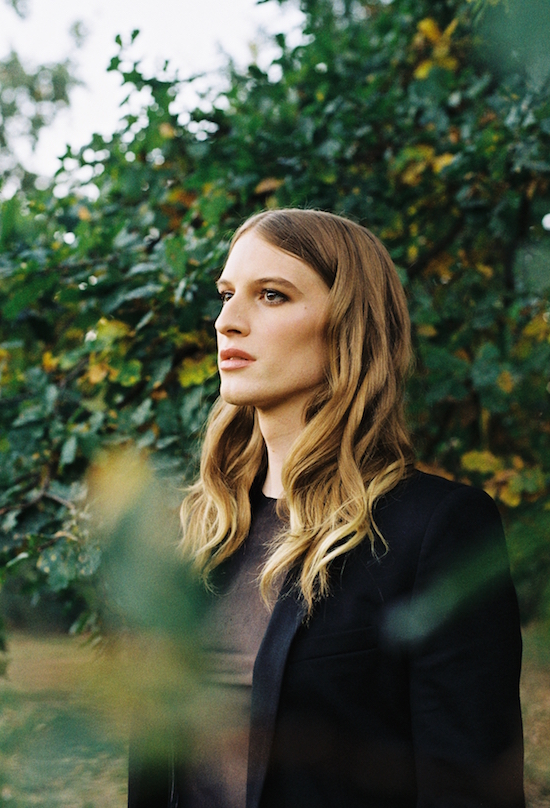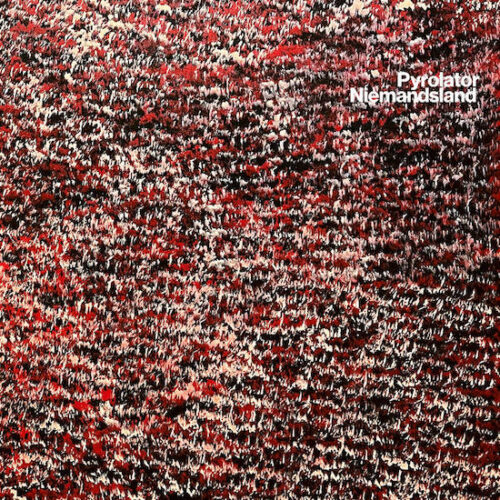Portrait by George Nebieridze. Hair and makeup by Sarah Hartgens
I should confess; I can’t really listen to music anymore. While I’m at it, I can’t really read anymore either. An unfortunate addiction to content and scrolling means my attention span is in shambles and for someone who purportedly cares about sounds and words (and who deals in both for a living), this leaves much to be desired.
As she nears the end of her set at Berghain for this year’s edition of CTM, Lyra Pramuk makes us wait. She took off her shoes one song ago and is now out of breath from dancing around the stage in her socks. We wait patiently as they catch their breath, stood in front of a few vases of flowers that kindly grace the stage and provide a gracious foil to the formidable space.
Amidst a culture of constant stimulation, amidst platforms designed to distract, patience for music as music (and not as wallpaper) seems dwindling, or at least mine is. With their debut album, Fountain, Lyra Pramuk presents a cycle of seven songs, thoughtfully assembled, that ask for otherwise.
Meditative and celebratory, the music of Fountain draws on folk histories, but it’s buoyed, not burdened, by them. Distilling ideas, provocations and uncertainties that feel pressing today, Pramuk’s explorations sidestep easy classification instead to ask for some time, some patience to be spent with them.
On a Friday afternoon, Pramuk illuminates some of her intentions behind the record and behind her practice. They tell me of the importance of sharing, and of the roles that warmth, joy and eroticism play in their practice. Careful to embrace complexity, her words are considered throughout.
You’ve been embedded in the music world for some time, but only just released your first solo record. How has it changed your role in this scene, or your understanding of yourself as an artist?
Lyra Pramuk: It’s weird; I’ve had a slow, steady tour schedule since Fall 2017, even without having a proper solo release out. I was trying to see how much I could push a mystique around that. I was doing some press, not so much music press but “diversity press,” if you will.
I only set out to make an album because everyone told me I had to. It’s sort of true though, the kind of tour schedule I want isn’t possible without one. So much of that has to do with the economy and what people expect of you. And I’m not even that involved in the industry. I’m not a journalist; I’m not someone who is really in the culture, who religiously reads reviews. I’ve been very much in my own world, so I feel kind of naive about all of this. I’m more likely to want to talk about Susan Sontag or aesthetics.
I’ve been doing quite a bit of press, which is cool, but it’s also exhausting. I’m excited to see what happens, though I’m not seeking fame. That side of it kind of stresses me out, I don’t want that and I don’t really carry that kind of energy with me, I don’t want to post on socials everyday.
So your practice has always centred more around performance?
LP: Exactly, it’s more about my relationship with my body in a live experience. It’s always been more about that, and about ecstatic or spiritual kinds of undertones in music.
The recorded music side of things I got more into in via music concréte and thinking about electronic music as sculpture. Having the space of a DAW lets you build tapestries and compose, and view compositions as material, waveforms as material. I see it as a craft practice when I work on that stuff.
Live looping or layering vocals in real time is kind of the only way to bridge those two worlds, it’s been around for a long time and it’s not the most incredible technical development anymore, but it still gives you the ability to do some of that composing in real time in a concert. I started doing a lot of live looping when I started performing.
Your performance at Berghain felt joyful and celebratory in a way that feels kind of rare, it reminded me of a certain kind of energy that Holly Herndon and Colin Self shows can have. How has working with them influenced what you do?
LP: It’s crazy how relationships like ours get built, I’ve learned so much from both Colin and Holly. I started making music that was kind of getting into this cyborgian vocal layering stuff when I was like 21 and was just finishing college. I felt really alone at the time, I was at a classical music conservatory but I didn’t want to do that. I didn’t want to work in this ivory tower academic kind of way, even though there was stuff I could appreciate about those musical languages. I felt really alone in the sense that I was too into experimental pop for the classical music kids, but if I was in pop circles, I was this weird music conservatory person.
I think the reason that I feel like there’s a mutual understanding between people like Holly, Colin and myself is that we have similar backgrounds and similar ways of relating to information and musical aesthetics. That’s an aspect of community-having a shared language. I’m aware even here in this electronic music scene, my background is pretty different from a lot of people, but that diversity is really good.
When I moved to Berlin, Holly and Colin were both really influential to me in terms of wanting to look at complex emotions and still be hopeful, in terms of tying theory into work, tying academic experiences into work, tying singing and vocals into it. I was already doing that but when you find more people doing it, everyone gets amplified.
I’ve been really involved in both of their projects and in both of their projects, the work was with me and more people, they were like small, collaborative communities. It’s so easy to feel really alone in what you’re doing, versus being a part of a shared practice like that. I felt like I needed to make an album for me to understand who I am as a composer and artist. Being a part of so many projects like that helped give me the courage to do that and my hope is that after putting my album out, I will be more courageous to do more collaborations and foster more community work like they did too.
Could you expand a bit on the role of joy and hope in your practice? You’ve mentioned that your music used to be darker, how and why did that change?
LP: There was a point in my life in my mid twenties where I reached a sort of spiritual clarity. I realised in my truth of truths, in my heart, that everything could be changeable and that the strict rules that I had perceived my whole life were illusions, that they could be trespassed, that laws were written by people could be amended. Everything is malleable, and that’s kind of erotic in the sense that everything can be rebirthed or renewed. There’s this endless transformational potential to life and nature, even if our whole planet is going to be burnt to a crisp and most humans die out because of what we do to it. Life will still continue in these gorgeous ways that we cannot even imagine.
Believing that and knowing that and trusting that is, for me, a kind of spirituality. There’s always hope beyond despair. Everything is beautiful, everything will end, everything has its cycles. It puts you in the present moment to make the most beautiful decisions. I think another part of building community is sharing that information.
Colin has this idea of a “research sister,” a form of non-biological kinship. It’s a kind of punk, hacker kind of research that involves sharing with each other, it’s really powerful. There’s so much that has been written by people who have already had to think through really tough shit. We need to arm ourselves with information, there are ways of making ideas translatable across a broader public. It’s necessary to pay attention and be able to formulate ideas, to be able to be specific and deal with complexity. It’s easy to want to shut everything out because our world is so complex. I get hope from reading, from friends, from people who don’t follow the rules.
Amidst all of this complexity, I feel like there is often a sense that in culture, everything has been done. Plenty of people have lamented the loss of the “new.” I think your record draws on certain histories but in order to uncover some untraversed territory. You mention certain concepts that are contemporary, like post-humanism, non-binarism and other poststructural ideas, which feel evident in your album as it’s simultaneously human, organic, alien, synthetic, strange and welcoming. How do these ideas filter into your writing?
LP: I got really into reading about Sufism and translations of Rumi. I have this book of spiritual poetry by women that goes back to 2000 BC, it’s all translated into English. A lot of what I’ve learned from spiritual seekers is about dichotomies being illusions, and as mortal creatures we spend a lot of time feeling pressured (and I still do) to pin ourselves down or categorise ourselves. We feel this pressure and we put it on others constantly. I feel like the kind of world we’re coming into and the kinds of challenges we’re facing require decategorisation and a kind of performative competence, being able to be fluid.
I don’t want to limit myself to any kind of mode of performance if it would prevent me from surviving or being a part of a project as best as I could. Being categorised and forced into a certain box would be reductive, the truth is much more complex than that. I’ve been trying to accept that but it’s really hard, most people don’t have a language for that and society can’t understand that. But I think we will get to a place where people will. I want to be brave about knowing the truth and representing it.
There’s this Anaïs Nin quote, “Life is a process of becoming, a combination of states we have to go through. Where people fail is that they wish to elect a state and remain in it. This is a kind of death.” That’s very spiritual too, I think. We have to keep changing.
Representing complexity is a beautiful thing, I like to think of myself in relation to plants or other forms of life that are growing and just doing what they do. That’s kind of inspiring too.



